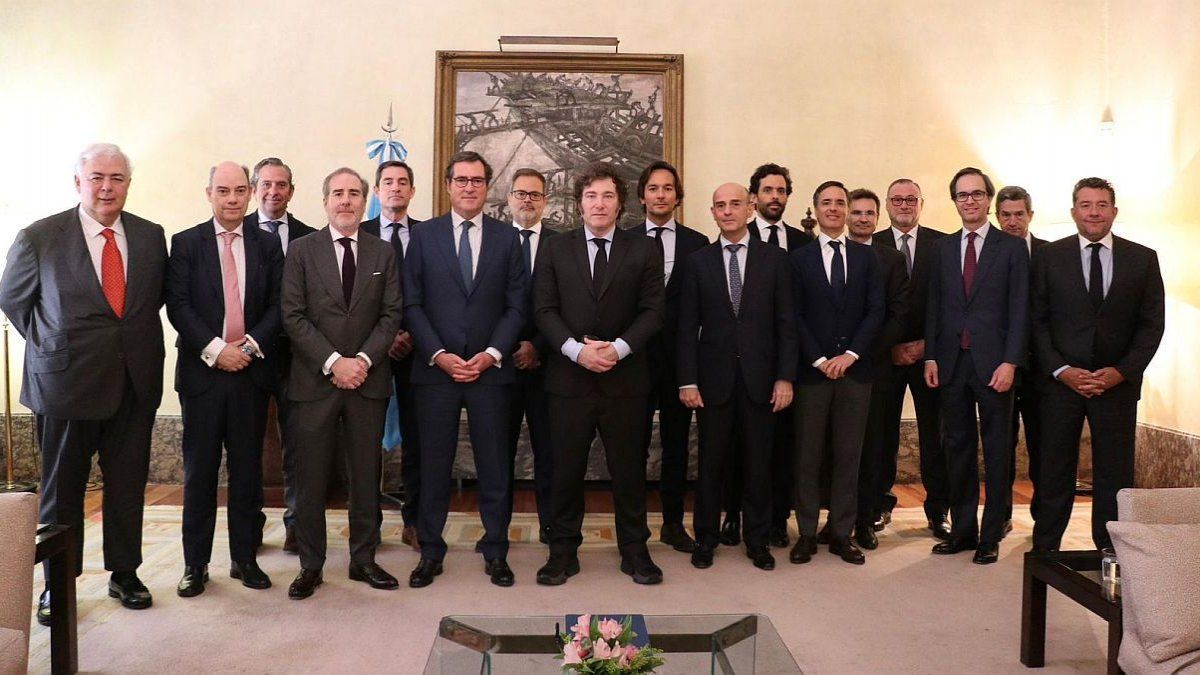At the local level, there are several reasons to support this idea. First of all, for those sectors in which Luis Caputo trust to drive the economy –oil and gas, mining, petroleum, financial intermediation, knowledge economy, field– The application of 17.5% COUNTRY tax came as a surprise and was not well received.
This is because since the return of the stocks, in 2019, companies generated reinvestments in their sectors, whose profits They could not repatriate to their parent companies.
By the beginning of 2024, with the arrival of Milei, they understood that the flow of capital generated It would not take long to be enabled to be transferred abroadopening the stocks through, as the President had promised to guarantee in the short term.
However, the possibility remains an expression of wish: the dollars to open the stocks are not there and the transfer of dividends and profits is carried out with a effective rate of 50%.
How do you arrive at that percentage? A source explains it this way: An international company that invested in Argentina between 2019 and 2024 and generated capital flow to repay those investments, will contribute to the 35% Profit + 7% dividend distribution tax + 17.5% of COUNTRY tax.
“For the Oil&Gas sector, the final rate is not competitive against the investment conditions in other global assets that compete with Vaca Muerta in the portfolio of foreign companies, putting at risk the investments being studied for after December 2024. For For example, in Brazil, the tax is 34.6%,” explains the same source, and concludes: “It is more attractive to invest in Lula’s Brazil than in Milei’s Argentina.”
According to the electricity generators, the main problem with said tax burden is the gap it generates with the official exchange rate, which, in this way, amounts to 50%.
“This ends up discouraging the transfer of dividends abroad, unless the parent company can afford said difference.”they explain in the sector.
The possibility of distributing profits and dividends abroad in a competitive manner is the main signal that international shareholders observe to determine the pace of investments for the coming years. Likewise, one of the main banks that operates in the country, prefers to clarify the delay in this process: “You have to give them time, they are just beginning and the path to macro order is marked”.
Most energy companies were also not satisfied with the offer of a bond in dollars maturing in 2038, which is quoted at 50% parity, to cancel the debt that CAMMESA contracted with the companies. So much so that the Secretary of Energy, Eduardo Chirillo, announced the extension of the term to generate individual agreements with the generators.
Leandro Mora Alfonsín, an economist specializing in productive development, understands how a key factor stability in the rules of the game. “If contracts change regularly, if there is no certainty about their repayment, if the regulatory framework changes, the operations associated with an investment weaken and, at the very least, do not deepen,” he warns based on the latest events.
“The ink is not dry on the contract that we are already breaching. You send the signal to the investment that you are throwing credibility to the ground,” said a source, in the same sense. If we add to this the postponement of the tariff update, a gas transporter warns that the sector is left, so far, with ““little taste”.
On the other side of the Atlantic, Spanish businessmen also expressed their reservations on the land that Milei is preparing to expand investment – an objective that motivated his last meeting with investors at the Argentine Embassy in Madrid, on Saturday.
It was the case of the group BBVA, Santander, Iberia, Abertis, Naturgy and Telephone who publicly bowed to the statements of Antonio Garamendi, President of the Spanish Confederation of Business Organizations.
The referent maintained that Milei’s statements are “out of tune.” “It is not the place or the place. It is not what is asked of two friendly countries. Spain is the main European investor in Argentina”.
For Hector Torres, former IMF official, surely Spanish businessmen “share the concerns of Argentine businessmen”, with the difference that they are not “encapsulated”.
“Evidently, Milei’s anger adds a ‘noise‘additional, which I do not believe is compensated by his proclaimed “faith” in capitalism,” Torres told this medium. In turn, he considers that if Milei achieves the opening of the stocks and economic growth, “they will forgive all her eccentricities.”
Juan Carlos Hallak, professor of International Economics at the UBA, understands that the President’s statements “contribute to a feeling of excess, unpredictability and instability” and analyzes them in a geopolitical key.
“It is not good to make statements to a natural ally, is it?”Who is going to support us in the negotiations with the Fund? Who supports us with the negotiations with the European Union with the agreement we want to reach? the specialist asks. “All this contributes to a feeling that later costs us dearly in terms of trying to compensate it with tax exemptions.”concludes Hallak.
Under a similar logic, Alfonsín highlights the association between countries as a strategic issue to promote business and investment, memorandums of understanding on technology transfer or productive and commercial integration.
“Underestimating the weight of international relations in the framework of a strategy for industrial development is thinking in “short blanket” mode, something that is complex and requires a lot of political leadership.“, warns the economist.
Source: Ambito




